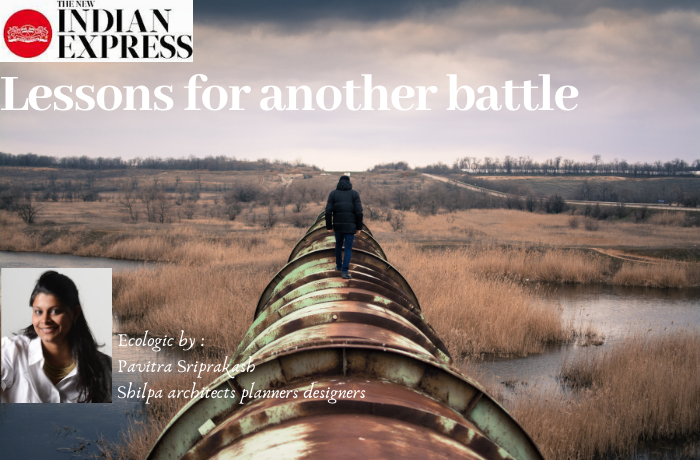06-Apr-2020 : Pavitra Sriprakash, Director and Chief Designer at Shilpa Architects Planners Designers writes a weekly column on Sustainability for The New Indian Express titled “ECOLOGIC”. This week’s article talks about climate change and Covid 19 – Lessons to Learn to be better prepared.
Full article below: (Also available at The New Indian Express Website)
Lessons for another battle
The world is shutdown! Major cities across the globe are all in some form of lockdown and the pandemic is all anyone can talk about. Cities and countries have come to a standstill and there is no other topic of interest or concern except the coronavirus. Still, it makes me wonder, as we deal with this current crisis, can we learn anything that could help us combat another crisis that is slowly but surely coming our way – climate change?
There are similarities between the coronavirus and climate change, primarily that they both can debilitate the human species. However, they operate on different timescales. COVID-19 has locked down the world in just a few weeks. Michael Gerrard, Law Professor from Columbia University’s Earth Institute, had this to say — “Climate change is much slower acting, but ultimately could be at least as disruptive.” Jeffrey Shaman, another climate change expert, concurred. “Both climate change and the coronavirus as disrupters have lots of downstream consequences.
With climate change, it’s not just the climate system that changes—it affects human health, food security, agricultural security, political and economic stability, and governance. It has all these ripple effects that affect all components of society in a very slow way that’s maybe hard to quantify at times. Coronavirus is more immediate, but it’s doing the same thing. It has completely disrupted our society in a way that we haven’t seen since World War II.”
With both COVID-19 and climate change, people run the risk of not taking action until it’s too late. Just like the virus has an incubation period when one cannot know they have been infected, similarly, the effects of climate change have already set in, but by the time we catch on, it may be just in time for a mad scramble to keep us afloat. In both cases, prevention is better than cure. Better to nip it in the bud instead of dealing with overwhelming circumstances in the future.
As individuals, most of us understand the importance of both the coronavirus and climate change. Just as we know that social distancing works for the virus, we know that a reduced carbon footprint can limit climate change. But somehow the perceived benefit from that reduction seems negligible- giving a weak incentive for each of us to personally reduce our emissions. Just as some governments around the world have responded differently, with an initial denial of the virus thereby prolonging the lockdown, the result is a huge disruption to the world economy that we will be feeling the effects of for the rest of 2020.
The biggest lesson from this crisis was stressed by both Gerrard and Shaman: Societies around the world must learn to value science and the warnings of scientists when they make projections about terrible but plausible scenarios. Countries need to respect objective facts and not be in denial of things they simply don’t want to face. Besides, “We need to value pro-active actions and planning,” said Shaman. “We need to invest in doing things about climate change now and we need to invest in doing things about pandemics of the future now…after this is over.”



